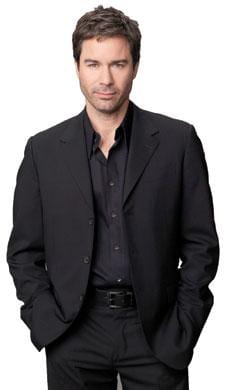Gays can’t play straight.
That was the central argument of openly gay Newsweek columnist Ramin Setoodeh’s April 26 article, “Straight Jacket,” which disparaged out actor Sean Hayes’ performance as a woman-loving man in the New York revival of Promises, Promises.
The inevitable Broadway backlash was led by Hayes’ Promises co-star, Kristin Chenoweth, who, in a sternly worded letter to Newsweek’s editors, accused Setoodeh of internalized homophobia.
Now, another of Hayes’ co-stars has spoken out.
“I think it’s insane ever to generalize about whether gay can play straight or straight can play gay,” says Eric McCormack on the phone from his home in Los Angeles.
The Canadian actor and part-time Vancouverite starred with Hayes for eight seasons on the groundbreaking gay sitcom Will & Grace.
“I think people are entitled to their own opinion,” he says of Setoodeh’s article. “It’s a free country. But, [this]? It’s ludicrous!”
McCormack is particularly well positioned to speak on the issue because, as a straight man playing the first gay lead character on network television, he was often criticized for the exact opposite reason: straight playing gay.
Merely playing Will Truman meant McCormack’s sexuality was often questioned. Either he was too gay or not gay enough. “Early on, it was like I was damned if I do, damned if I don’t,” McCormack says, remembering criticisms from both sides of the culture wars.
And yet, he argues, he was acting and it’s an actor’s job to pretend.
“It doesn’t happen in almost any other way,” he reasons. “You never watch ER and go ‘Hey! These guys aren’t doctors!’ Why does it only happen with gays? I don’t understand.”
Hayes, who played Will & Grace’s queeny, über-homo, Jack McFarland, certainly drew speculation as to his sexual orientation. (Okay, straights speculated — the gays knew.)
But despite urging and prodding from gay advocates and gay media, he refused to speak on the record about his sexuality.
“This was always Sean’s issue,” says McCormack of his friend, “because he just recently, I guess, ‘came out’ in The Advocate (April 2010 issue), which, of course, was hilarious because we all knew. But his thing was always, ‘Look, I’m gay. I simply don’t want to talk about it all the time.’”
While Setoodeh cut into Hayes for his “wooden,” “insincere” and “unintentionally camp” performance, likening his homosexuality to “the pink elephant in the room,” the Newsweek critic seems to be in the minority. Hayes was nominated for an Outer Critics Circle Award and a Tony Award. (Hayes also hosted this year’s Tony Awards broadcast.)
For his part, McCormack, who saw Promises, Promises three weeks ago, calls Hayes’ performance “great and nebbish and funny.”
However, he also echoes the opinion of venerable New York Times theatre critic Ben Brantley by pointing out that the chemistry between Hayes and Chenoweth doesn’t really come across as romantic. But that, he intimates, has less to do with Hayes’ sexuality and more to do with the play itself.
Asked if he thinks Hayes is being punished for not staying in the closet, McCormack is pragmatic.
“I think the uproar just gives it credence. It’s one guy writing one article, and if nobody’d mentioned it, it would have gone away,” he says.
“A little knowledge is a dangerous thing, though,” he notes. “And if you know someone is gay, if you know someone is blind, whatever it is, if you know, that’s how you’re going to perceive that person’s performance. Nobody ever seemed to have the problem with Rock Hudson because nobody knew he was gay.
“If nobody knew Sean was gay, or if Sean had never played Jack, would it be different?”
McCormack doesn’t answer his own question. However, he’s definitely not vague when it comes to his own stance on the issue.
“The idea of judging what anybody can play based on prejudice,” he insists, “is just stupid.”

 Why you can trust Xtra
Why you can trust Xtra


